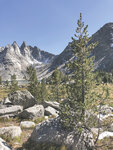Mostly Clear, 56° F
Plant ecophysiologist Dr. Danielle Ulrich examines plant life history strategies to improve our understanding of how forests will respond to future climates. With pines, she’s found that some, …
This item is available in full to subscribers.
The Powell Tribune has expanded its online content. To continue reading, you will need to either log in to your subscriber account, or purchase a subscription.
If you are a current print subscriber, you can set up a free web account by clicking here.
If you already have a web account, but need to reset it, you can do so by clicking here.
If you would like to purchase a subscription click here.
Please log in to continue |
|


Plant ecophysiologist Dr. Danielle Ulrich examines plant life history strategies to improve our understanding of how forests will respond to future climates. With pines, she’s found that some, like whitebark pine, are specialists, while others, such as limber pine, are generalists.
Ulrich, assistant professor in ecology at Montana State University, presents Functional traits underlie specialist-generalist strategies in whitebark pine and limber pine at the next Draper Natural History Museum Lunchtime Expedition lecture. The free talk takes place Thursday, May 4 at noon in the Buffalo Bill Center of the West’s Coe Auditorium.
Those who prefer to attend virtually via Zoom webinar may do so by registering at us02web.zoom.us/webinar/register/WN_SS4izMG_Rwaa2bxSqZO8gw.
Ulrich says, “Whitebark pine and limber pine are two threatened high-elevation pines that have similar growth and morphology.” Yet the two species have different elevational distributions, with whitebark pine viewed as a specialist inhabiting a narrower elevation range, and limber pine as a generalist inhabiting a broader elevation range.
In the presentation, Ulrich discusses her research comparing the physiological and morphological traits of greenhouse-grown 5-year-old whitebark pine and limber pine. She and her team studied the physiological mechanisms that underlie species establishment and survival, and how juvenile physiology contributes to their contrasting distributions and their generalist-specialist strategies.
The Draper Museum’s Lunchtime Expedition lecture series, which takes place the first Thursday of each month, has been made possible through support from Sage Creek Ranch and the Nancy-Carroll Draper Charitable Foundation.
In her work as a plant ecophysiologist and assistant professor in ecology at MSU, Ulrich investigates plant physiological responses to and interactions with their environments in forest, agricultural, and grassland ecosystems to understand the physiological mechanisms underlying plant responses to environmental stress and future climates.
Ulrich earned her BA at Bowdoin College, and her MS and Ph.D. at Oregon State University. She completed a postdoctoral fellowship at the Los Alamos National Laboratory. In her spare time, Ulrich enjoys mountain biking in forests, telemark skiing, trail running, and whitewater rafting with her dog and partner.